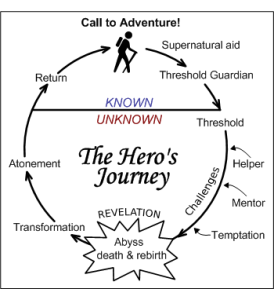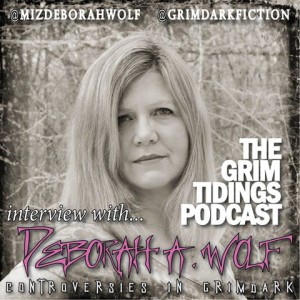Most of you who are writers have probably already heard about the Hero’s Journey. Described by Joseph Campbell in The Hero With a Thousand Faces (1949), The Hero’s Journey—or monomyth—is a basic pattern that can be found in stories and legends around the world:

The Hero’s Journey
The Journey can be broken down into four stages. In Stage 1, the Hero leaves the familiar world behind. In Stage 2, the Hero learns to survive in a strange new world. In Stage 3, the Hero uses this new knowledge to master the unknown world, and in Stage 4 the Hero returns to the familiar world, having gained some necessary bit of knowledge or shiny object.
This is an oversimplification of a very complex and fascinating topic. I would encourage you, especially if you are a writer, to read further here:
http://tvtropes.org/pmwiki/pmwiki.php/Main/TheHerosJourney
And here:
http://www.jcf.org/new/index.php
And here:
http://www.thewritersjourney.com/hero’s_journey.htm
Consider this your Call to Adventure.
I’ve spent a lot of time geeking out about the Hero’s Journey, because storytelling is kind of my thing. If writing is an adventure—and believe me, writing is an adventure—I feel like I’m at stage 2.5. I’ve almost got the hang of this strange new world and I’m getting to the point where I don’t cut myself with my own sword too often. And I’d like to share some thoughts on the Hero’s Journey in storytelling.
I sat down one day and made a Hero’s Journey spreadsheet, and broke down parts of the story lines of JRR Tolkien’s Lord of the Rings, Robert Jordan’s Eye of the World, and George RR Martin’s Game of Thrones.
This is what I do in my spare time. Don’t judge me.
When I did this, I noticed something interesting.
In each story, the Call to Adventure was precipitated by an unlooked-for and somewhat unwanted visitor. Here we have a protagonist, our will-be Hero, happily smoking a pipe, helping Dad with farmboy chores, or lopping off the head of a deserter—Familiar World stuff—when along comes a Sage with some bit of news. Grab your boots and walking-stick, it’s time for an adventure.
What I found interesting was the thought that this Sage—who may become a mentor or helper character in the not too distant future—is an unwelcome visitor. Of course the Call to Adventure is often resisted at first, because who wants to leave a nice Hobbit-hole and a larder full of cheese and bacon? But the Hero’s initial reaction to the person initiating the call is worth examining further. This visitor is often seen as a helper or mentor character, but I would argue that this is also an antagonist.
I began to call this character the Fey Visitor. There’s something otherworldly, powerful, and vaguely frightening about this person. This visitor is viewed with suspicion and unease, and a general wish that they would just go away and leave the Hero in peace.
Of course, the Fey Visitor is a herald to another character or group of characters—Nazgul, Myrdraal, or Lannisters—and this visitor is a direct threat to our Hero’s safety, to the extent that the Hero will be forced to embark upon the journey, and may also be forced to rely upon the Fey Visitor’s strange powers for survival.
I call this second visitor the Fell Visitor, and see it as a dark-mirror image of the Fey Visitor. It seems to me that a story may be enhanced and deepened if the storyteller keeps these two Visitors in mind, plays them off against one another, and has fun comparing and contrasting them as two sides of the same coin. Moiraine and the Myrddraal, King Robert Bareatheon and Cersei Lannister, Gandalf and the Nazgul. Someone who wants you to move and change, and someone else who will kill you if you don’t.
As the Hero continues into the strange new world, eventually lessons will be learned and skills gained that will enable the Hero to overpower either of these antagonists, but for now I will leave Frodo trembling in fear as he agrees to this impossible task, when all he really wants to do is go home, have a smoke, and sit down to a nice little dinner.
Jai to wai,
Debi


